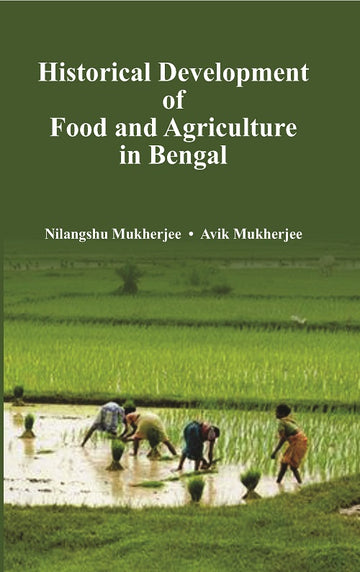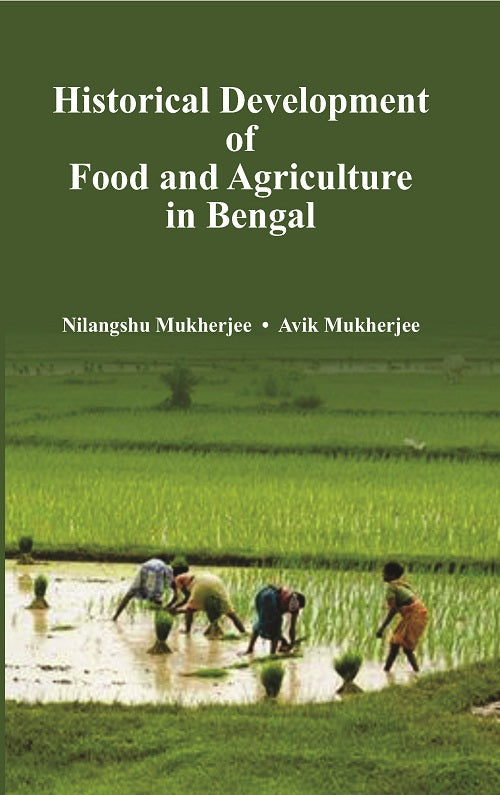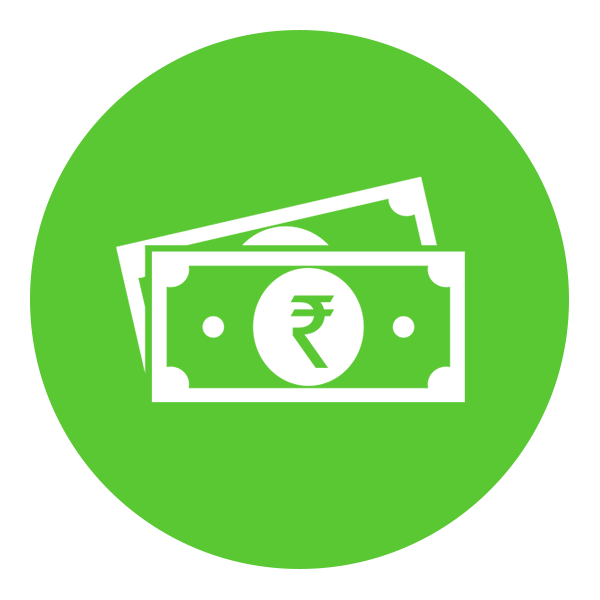Historical Development of Food and Agriculture in Bengal
Regular price
₹ 837
Sale price
₹ 837
Regular price
₹ 900
Unit price
Save 7%
| Item Weight | 400 Grams |
| ISBN | 978-9380222677 |
| Author | Nilangshu Mukherjee, Avik Mukherjee |
| Language | English |
| Publisher | GenNext Publication |
| Pages | 311 p |
| Book Type | Hardbound |
| Dimensions | 25 X 15 X 5 |
| Publishing year | 2015 |
| Edition | 1st |
| Return Policy | 5 days Return and Exchange |

Historical Development of Food and Agriculture in Bengal
Product description
Shipping & Return
Offers & Coupons
ABOUT THE BOOK:- The book–'Historical Development of Agriculture and Food in Bengal' is first attempt of its kind in India. Despite the time and again change of geographical area Bengal remained united in its diversity and rich with its mixed people and culture. As a result this fertile land was strong to overcome the disastrous events. With a large population it continued to be food-deficit even in eighties of last century when also farming was 'bargdars' (share-croppers) receiving right to 'barga-land' farming in Bengal became 'small' and 'marginal' farming. Applying their experience, skill and innovativeness they increased food production and the state achieved self-sufficiency in food by nineties of last century. Subsequently, farmers started switching over slowly to shor t -dur a t ion c a sh- c rops l ike vegetables, flowers etc. to enhance income. The book presents twelve periods of time from 'early weapon-making and ' searching natural foods' passed through nine other historical periods to reach 'modern agriculture' and 'ready-to-eat food' era of this century. The dramatic course of events traced in this land although different could show there the path to trace their course of events. All together would form the valuable 'roots' of anchorage for the country to progress and develop. Hence this book, it is hoped, would be useful for people interested in understanding course of events for progress of food and agriculture in their state as also the country with passing of time. ABOUT THE AUTHOR:- Dr. Nilangshu Mukherjee, B. Sc. Ag., M.Sc. Ag., Ph.D (K.U) Professor of Plant Pathology and Dean, Faculty of Agriculture, Bidhan Chandra Krishi Viswavidyalaya (Retd.) Nearly 40 years experience of teaching agriculture, Plant pathology, plant bacteriology to UG, PG and Ph.D. students and supervising 16 Ph. D. and 22 M.Sc Ag. Students' research work for fulfillment of their degrees. Has 87 research papers to his credit in both Indian and foreign journals. Author of 3 books on Agricultural jointly with Dr. A.M. He was Chief Editor of History of Agricultural Education in Bengal. Four more books are published in Bengali language, Life Member of 3 all India societies of agriculture and Editor of number of Bengali Journals. He was member of State Agriculture Commission, West Bengal, QRT-team (ICAR) on Mushrooms and Chairman, Advisory Committee on Agriculture to Chief Minister's Science & Technology Committee.Dr. Avik Mukherjee, B.Tech (DT), M.Sc., Dairy Bacteriology (WBUAFS), M.S & Ph.D. in Food Science & Nutrition, University of Minnesota, USA. He was a post Doctoral Fellow at University of Colorado and presently Professor & Head, Dept. of Food Technology, Haldia Institute of Technology, West Bengal. Conducted researches on microbiology & safety of fresh vegetables, fruits and meat products. Published eight research papers– all in foreign journals. Attended and delivered lectures on food safety & security in different fora all over India. He has written book chapter of 'Food Safety' and authored books on 'Microbiology : general & applied and 'Encyclopaedia of Food & Agriculture.' He was awarded 'Outstanding Student Award' of Univ. of Minnesota and 'Young Scientists Reseach Project' from AICTE. He is a member, Board of Studies of WBUT. CONTENTS:- Introduction Historical Development of Agriculture and Food in Bengal • Land surface development • River systems of Bengal • Weather and climate of Bengal. Origin and Evolution of Life Arrival of humans and evolution • In search of food • In Search of Food • Weapon making and their use : Paleolithic era • Food gains attention. Neolithic Revolution and the Beginning of Agriculture The Beginning • Agriculture from Neolithic to Heliolithic era (- BC) • Paddy agriculture of Bengal • Food preparation earthen pot and fire • Bengal agriculture in pre-historic era • Pre-Aryan Bengalis • Villages and ‘haats’ in Bengali. Heliolithic to Iron Era Context • Pandurajar Dhibi’ (- BC) • Gangaridae Civiisation (- BC) • Women and ‘Rannaghar’ (separate cooking space). Maurya and Post-Maurya Period (- BC) Agriculture and Villages • Agricultural Marketing • Bengali Food : early diversifications. Agriculture in Gupta and Post-Gupta Period (Fourth Cent. - AD) Land, village and habitations • ‘Krishi Parashar’ (th cent. or earlier) • Maxims (‘Bachan’), Proverbs (‘Prabad’) and Agriculture of Bengal (th to th century) • Agriculture in vow (‘Broto’), festival (‘Parob’) and fete (“utsav”) • Spices and Bengali cuisine. Agriculture during Pal-Dynasty (- AD) Administration and agriculture • Basic method of Food preparation • ‘Vriksha Ayurveda’ and Surapal (Twelfth century) • Development of Bengali food habit. Agriculture during Sen Period (- AD) Agriculture in the published literatures of the time • Food culture in Bengal • Festivals and food • Fasting and food • Foods in worships in Bengali homes. Muslim and Post-Muslim Period in Bengal (- AD) Muslims in Bengal • Agriculture in midst of religious unrests and battle • Enrichment of Bengali food culture • Food in festivals of Bengal. Bengal Agriculture in Mughal Period (- AD) Land use order and tax system • Farmers’ life and Food • Mughol food and other culture in Bengal • Food culture from abroad. Bengal Agriculture During English Rule (- AD) Bengali villages in Nineteenth Century • Farmers’ uprisings in th century • Farmer’s movement ‘Tebhaga’ • Award of Some rights to Farmers • Cultivations in th Century • Influence of personalities on Bengal agriculture • Agricultural development through Government initiatives • State of affairs in different sectors of Agriculture • Husbandry of different animals• Mushrooms : Collection and Cultivation • European food culture and Bengali foods • Processing , Storage and Bengal agriculture • Roads, Transport and ‘Hat-bazar’ (markets) • Variety of food from different communities in India. Agriculture in Modern Times (-) First three decades after independence • Bengali Food Culture takes shape • Fish preparations • Special Fish dishes • General components of daily meal (lunch) in Bengal • Next three decades : (End of seventies to first of st) • Land Reform : Take over and Distribution of Land • Land acquisition for urbanisation and infrastructure development • Industrialisation and development of Special Economic Zone (SEZ) • Development of Roads and other Infrastructure • Panchayet System and Delegation of power • Agro- climatic zones, preparing plans and zonal research • Seeds and agriculture • Irrigation development • Nutrition of crops and chemical fertilisers • Organic Farming • Progress in cultivation of fruits, flowers, vegetables and spices • Food crops to commercial crops • Fodder cultivation • Crop protection • Cultivation of exportable fishes • Crop Insurance • Ready to eat Food culture • Changing weather and agriculture • Co-operative and agriculture • Agrobased multi-functional projects • Agricultural extension through targeted project implementation • Agricultural Marketing • Rural people dependent on agriculture • Women and agriculture • Younger generation in agriculture • Traditional knowledge and Indigenous technology • Modern Technology in Agriculture. Conclusion References Consulted Index The Title 'Historical Development of Food and Agriculture in Bengal written/authored/edited by Nilangshu Mukherjee, Avik Mukherjee', published in the year 2015. The ISBN 9789380222677 is assigned to the Hardcover version of this title. This book has total of pp. 311 (Pages). The publisher of this title is GenNext Publication. This Book is in English. The subject of this book is History / Agriculture / Religion. Size of the book is 14.34 x 22.59 cms Vol:-
- Sabr– Your order is usually dispatched within 24 hours of placing the order.
- Raftaar– We offer express delivery, typically arriving in 2-5 days. Please keep your phone reachable.
- Sukoon– Easy returns and replacements within 5 days.
- Dastoor– COD and shipping charges may apply to certain items.
Use code FIRSTORDER to get 5% off your first order.
You can also Earn up to 10% Cashback with POP Coins and redeem it in your future orders.








